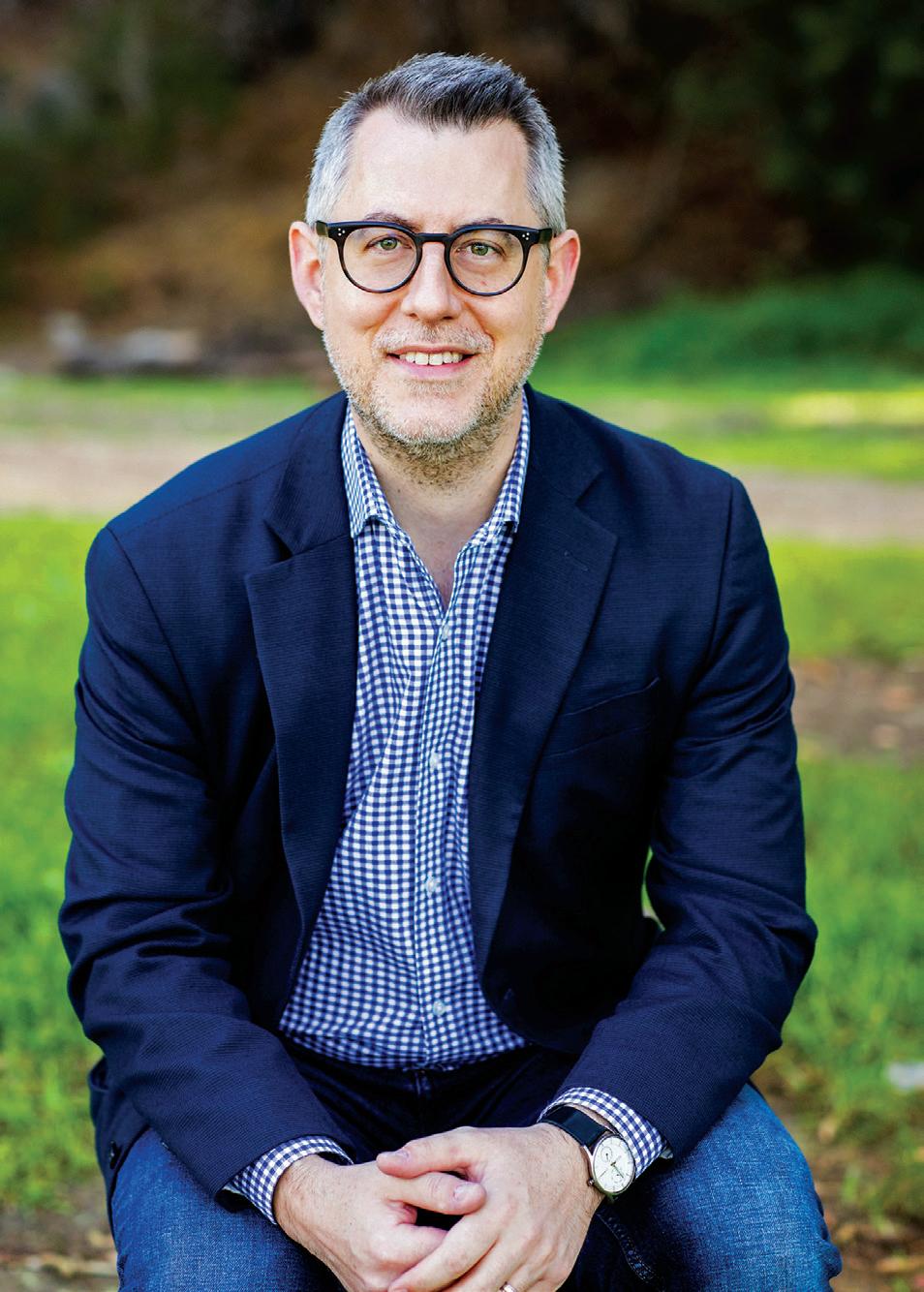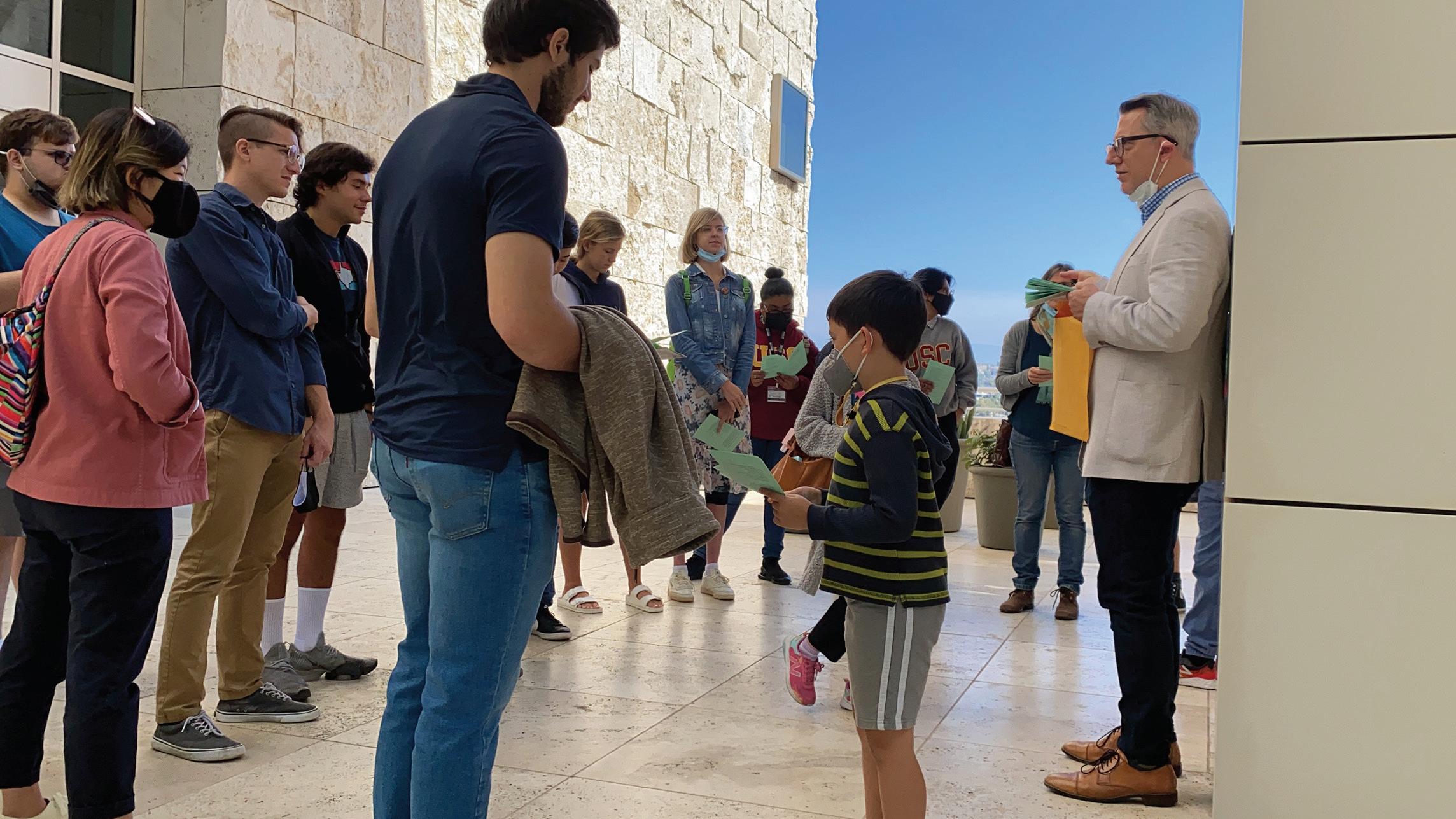
5 minute read
Reading Augustine at USC
16
BY DAVID ALBERTSON, ASSOCIATE PROFESSOR OF RELIGION (USC) AND EXECUTIVE DIRECTOR OF NOVA FORUM
When you enter Our Savior, if you look toward the altar and gaze up at the stained-glass windows above, you can catch a glimpse of St. Augustine of Hippo. He stands shoulder to shoulder with other doctors of the Church, between St. Peter Canisius and St. Teresa of Avila. Silently he peers back at us beneath the golden apse—an uncharacteristic silence, given how much he taught and preached, lectured and confessed, debated and praised, first as a young adult convert, then as a bishop, and still now as the greatest mind of the ancient Catholic faith.
A passionate, energetic young man, Augustine grew up in what is today Algeria. At 17 he moved to the port city of Carthage, delighted to be far from his mother and father, about a four hour drive away. There he latched onto some questionable friends, pursued questionable relationships, and only after a few years took charge of his life. He bought into a faddish spirituality, an episode he later found embarrassing to recount. Then the young man took a serious turn, reading all the ancient philosophy he could find. He got a job teaching. He broke up with his girlfriend, and his best friend died. Still, he was restless, full of ambition and hope for a meaningful life, but unsure of who he was and if anything mattered. If this story sounds familiar, that’s one of the reasons I love teaching Augustine’s Confessions to USC undergraduates, as I have in every Fall semester since I arrived in 2007.
During this transitional period as a young adult, Augustine met a handful of Catholic mentors who impressed him with their intellectual sophistication and holiness of life. He learned how to read the Bible not as fairy tales for children (as he had thought), but as an indispensable guidebook for thinking adults, the code that unlocks the meaning of human desires. After months of turmoil, Augustine broke down in tears of repentance and put his life in God’s hands. At the age of 33, he was baptized into the faith on the vigil of Easter 387 in Milan. By his early 40s, he wrote his classic memoir, Confessions, which tells the story of his conversion, openly and frankly for fellow Christians to read, laying bare his inner struggles, desperate prayers, wincing regrets, and ultimately his joy in God’s mercy.
Augustine’s Confessions is one of the greatest works of Latin literature ever composed and for good reason is studied in Classics departments at the finest secular universities. But that book, I tell my students, is more than a spiritual autobiography or literary exercise. It is a philosophical breakthrough: a new account of what it means to be human, to be a creature with a Creator. Augustine’s experience of becoming Catholic opened up for him a vista on the human condition that surpassed what the ancient world had mustered to date in Plato, the Stoic sages, or Cicero.
Augustine depicts us human beings as bundles of fragmentary, conflicting desires who deceive ourselves about our motivations and hopes. In his college days, he wrote: “the single desire that dominated by search for delight was simply to love and to be loved.” But after his conversion he realized that only God’s love sufficed: “You have made us for yourself, and our heart is restless until it rests in you.” Most of all, we humans are not God; we are born into the flow of time and live locked within its limitations. We make mistakes we cannot repair, stuck on the conveyor belt that turns past into future. We
17
do things we cannot account for, and we pain those we love for reasons we can’t comprehend. “I had become to myself a place of unhappiness in which I could not bear to be; but I could not escape from myself. … Where should I go to escape from myself?” Augustine says his innermost self was but a “tremendous question” to be answered.
If he was the question, the answer was the Word. The very medium of language, he came to see, reflects the divine Word who is Jesus Christ. Like words in a sentence, each human life passes to make room for the next, under the caring eye of the God who speaks to us. Stretching the limits of language, the spiritual exercise of “confessing” submits our humble words in service to our Creator: either what
Augustine calls the confession of praise—speaking God’s greatness—or the confession of sin—speaking our weakness. Together both “confessions” travel the full distance between creature and Creator, measuring the finitude of human beings. Ultimately it is God, the divine Beloved, who seduces Augustine away from his petty infatuations. “Late have I loved you, Beauty so old and so new: late have I loved you,” he sings at the end of the memoir. “You were with me, and I was not with you. You called and cried out loud and shattered my deafness. You were radiant and resplendent, and you put to flight my blindness.” This month I’ve been reading Augustine with Catholic students from the USC Caruso Center. In 2020, just before the pandemic crisis emerged, we launched the Nova Forum for Catholic Thought at USC (see novaform.org). This new initiative invites undergraduate and graduate students to encounter the Catholic intellectual tradition during their studies. We challenge them to integrate the life of the mind they pursue in their classes with the life of faith they pursue as Catholics. We offer seminars and colloquia on poetry, classics, politics, theology, and art.
In our own small way, Nova Forum introduces students to the greatest minds of the Catholic tradition. Besides Augustine we’ve been reading Dante, St. Thomas More, Pope Benedict XVI, and many others. We provide an open space where
students can encounter Catholic faculty mentors and ask the big questions. They learn the art of thinking with Catholic tradition and learning about their childhood faith, now as sophisticated young adults preparing for leadership in the marketplace and academy. In doing so we not only convey the riches of Catholic thought and culture to Catholic students. We also begin to share its wisdom with USC itself, as testimony and as a gift, as the university struggles to understand the meaning of creation. As Augustine writes: “God did not create and then depart; the things derived from him have their being in him. Look where he is—wherever there is a taste of truth.”
Left: Dr. Albertson facilitates Nova Forum's visit to see Catholic Art at the Getty Museum in Malibu, September 2021.









